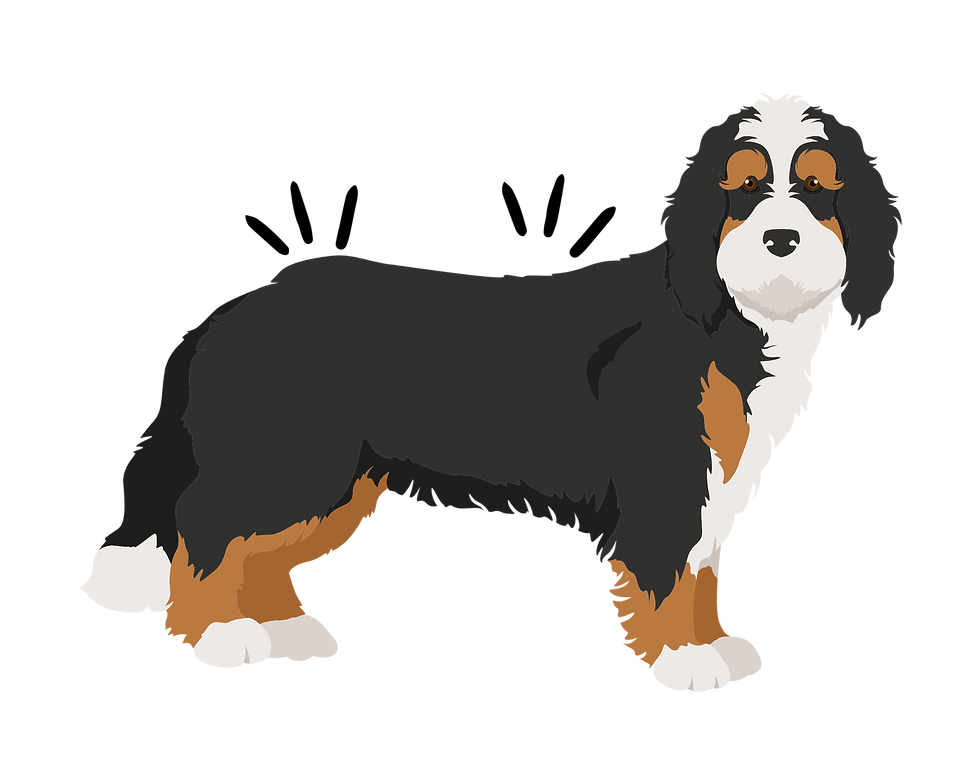
Bernedoodles, the beloved crossbreed between Bernese Mountain Dogs and Poodles, have captured the hearts of dog enthusiasts with their lovable nature and charming appearance. However, like any other dog breed, Bernedoodles can be prone to allergies. In this article, we will explore the types of allergies commonly found in Bernedoodles and provide helpful tips for identifying and managing them. By understanding and addressing these allergies, you can ensure your Bernedoodle stays comfortable and healthy.
Types of Allergies in Bernedoodles:
Bernedoodles can develop various allergies, and being aware of the signs and symptoms is crucial. Common allergy symptoms in Bernedoodles include itchy skin, excessive scratching, redness or inflammation, ear infections, and hair loss. Allergies can be caused by environmental factors such as pollen, dust mites, or mold, as well as parasites, medications, or certain foods.
Identifying Allergies:
If you suspect your Bernedoodle has allergies, it's important to keep a detailed log of their symptoms, noting when they occur and any potential triggers. This information will be valuable when consulting with your veterinarian, who can help diagnose the specific type of allergy and recommend appropriate treatment options.
Food Allergies:
Food allergies are a common concern for Bernedoodles. Some common food allergens for dogs include chicken, beef, dairy, wheat, and soy. To manage food allergies, carefully read labels and consider specialized dog food formulated for dogs with allergies. These foods often contain novel proteins, such as venison or duck, which are less likely to trigger an allergic reaction. It's also advisable to stick to one type of food and avoid introducing new treats or flavors that may contain allergens.
Managing Food Allergies:
To identify the specific food allergen affecting your Bernedoodle, your vet may recommend an elimination diet. This involves gradually introducing novel proteins and monitoring your dog's response. Keeping a food diary during this process can help track any changes in symptoms, making it easier to pinpoint the culprit. Remember, it's crucial to be patient during this process as it may take time to identify the allergen and find a suitable diet.
Feeding a Healthy Diet:
Regardless of allergies, providing a healthy diet is essential for your Bernedoodle's overall well-being. Opt for high-quality dog food that contains essential nutrients and supports a healthy immune system. Avoid fillers, artificial additives, and by-products. A balanced diet can boost your Bernedoodle's immune system, making them more resilient to allergies and other health issues.
Hypoallergenic Treats and Snacks:
While managing allergies, it's important to choose treats and snacks that are hypoallergenic and free from common allergens. Many pet stores offer a variety of hypoallergenic options, including treats made with novel proteins or grain-free ingredients. Always read the labels carefully to ensure they meet your Bernedoodle's dietary needs.
Allergies can pose a challenge for Bernedoodle owners, but with proper management and care, your furry friend can still enjoy a happy and healthy life. By observing and documenting symptoms, consulting with a veterinarian, and providing a balanced and allergen-free diet, you can minimize discomfort and promote your Bernedoodle's well-being. Remember, every dog is unique, and what works for one may not work
Need help identifying your pup's allergies? Check out this post: https://www.downhomedoodle.com/post/food-journal-for-allergy-identification-in-dogs
Stay safe and wag on!
Samantha
Down Home Doodle


Comments